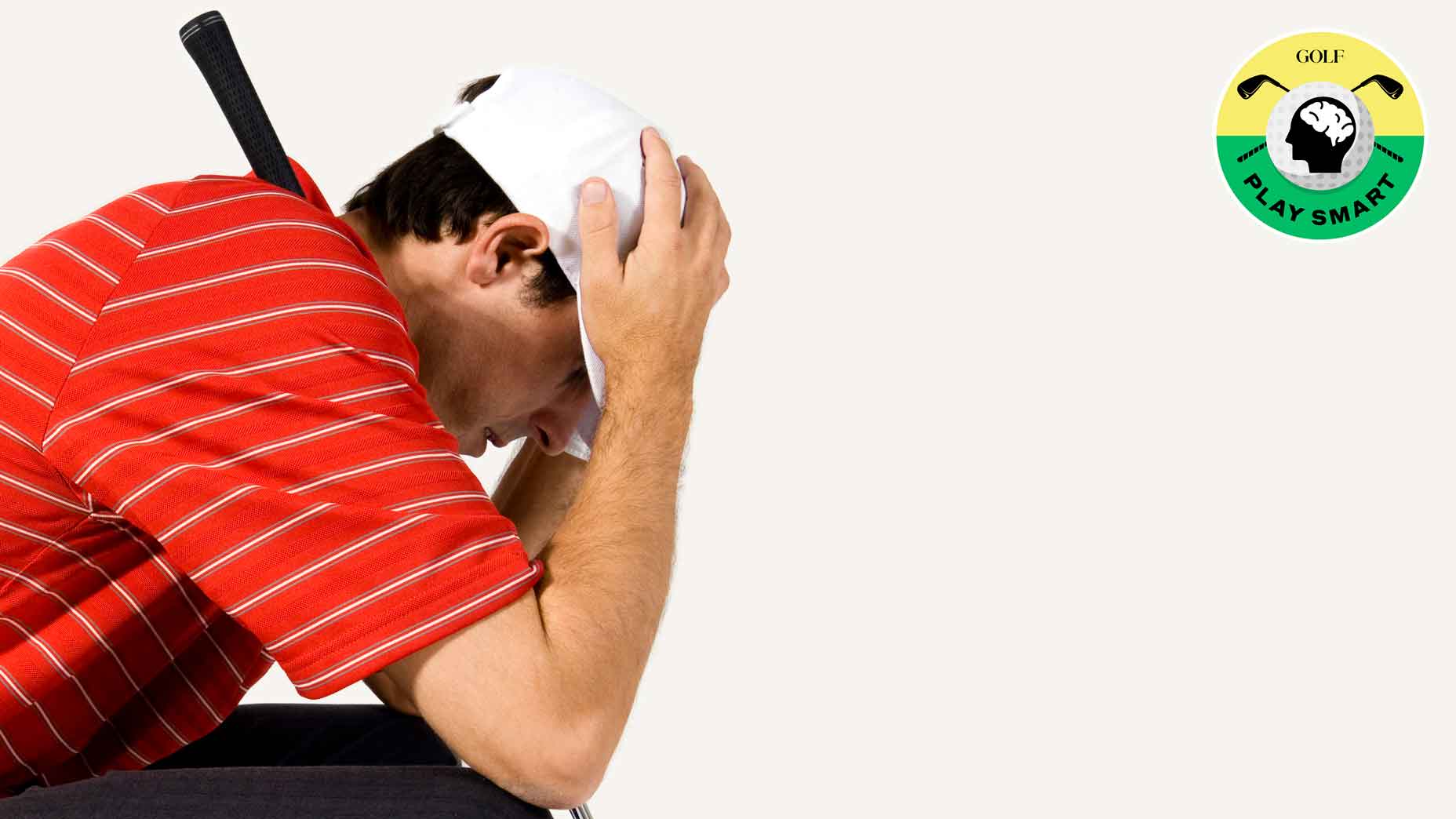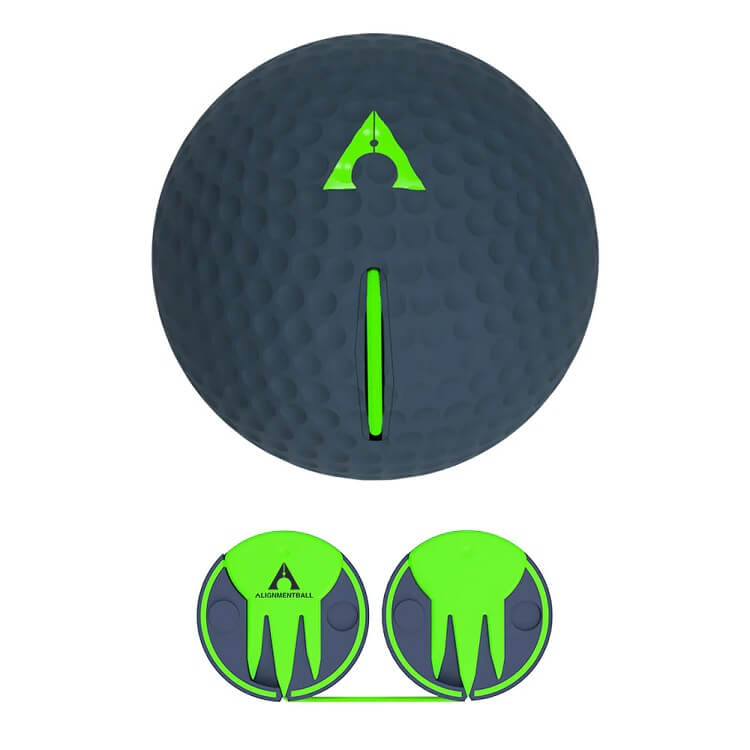
Performance Consultant Dr. Raymond Prior reminds you to take a deep breath and avoid anxiety on the golf course.
Getty Images
Imagine this all-too-familiar scenario. You’re staring down the fairway from a few feet behind your ball, trying to figure out where to align yourself before setting up for your shot. As you walk towards the ball, your mind begins to wander, taking you to a dark place of worry and self-doubt.
As you approach your ball, you begin to think even more as you stand over it, wondering what you’re doing wrong. You begin to get finicky and readjust your grip. You redistribute your weight. You look up, look down, look up, stare at the target, look back down and finally swing the club.
Fail.
Sure, you may have gotten lucky and hit a good shot, but, regardless of the outcome, you’ve become a victim of common golf anxiety that haunts players. In fact, it can ruin them.
It’s well-documented how some sort of golf anxiety can impact even the best golfers, with pro players like Matthew Wolff and Aaron Wise (among others) speaking out about their internal battles over the past few years.
And if you don’t yet understand how this type of anxiety can negatively impact your game, Dr. Raymond Prior — a Performance Consultant and owner of RFP Sport & Performance Consulting, Inc. — recently shared some much-needed info with PGA Golf Professional Brendon R. Elliott. Check it out below!
In addition to being a Performance Consultant, Dr. Prior also recently released a book called Golf Beneath the Surface, which tackles the topic of how performance is influenced by issues such as anxiety.
The book is the first performance psychology and performance neurology book for golfers, and it’s backed by rigorously researched neuroscience and psychology.
Instead of telling people what to think or not to think, Prior’s book places the reader’s own psychology front and center, helping them understand how the brain’s design impacts their performance, how to interact with their own thoughts and emotions, how to understand and effectively change unproductive habits and how to shape beliefs that cultivate and support stable confidence.
In his book, Raymond dispels several prominent myths about anxiety, including the myth that a little bit of anxiety is good. He does so in ways that are accessible and entertaining, challenge the status quo, and bring a long-overdue update to modern performance psychology in golf.
Understanding what anxiety is
Says Prior, “By definition, anxiety is worry about the uncertain future. Specifically, anxiety comes from our prefrontal cortex playing out all the worst-case scenarios about how uncertainty will unfold. When we fill in uncertainty with worst-case scenarios intensely enough, our brain starts to perceive the future we’ve imagined as threatening enough to try to avoid.
“Put simply, when we imagine the future in a way that is threatening enough, our brain does what it’s designed to do — which is to favor avoiding that future instead of pursuing the future we actually want.”
How anxiety impacts golfers and performance
So how does anxiety in golf occur? It has nothing to do with multitasking, says Prior. Instead, it’s actually the opposite, with golfers focusing too much on one singular task: Getting the ball to the spot they want it to.
“One of the most prominent challenges in golf is staying singularly focused on the shot at hand, filtering out anything that isn’t relevant. In essence, the singular task in golf is getting the golf ball from where it is to an intended target. Focusing on anything beyond that is multitasking.
“On the surface, it may seem like worrying about hitting a poor shot or having a poor round is innocuous, but it isn’t,” he continues. “Rather, it causes us to distract ourselves from the task of the shot at hand. Research measuring various skill-based and performance outcomes clearly shows that any additional task is enough to impair performance, regardless of skill level.”
How to handle golf anxiety
With some background into what anxiety is and how it impacts performance, Prior closed the discussion with some suggestions for those who may struggle with the feeling.
“When it comes to anxiety, tips won’t cut it. Our brain is designed to see through tips, tricks, hacks and other distraction techniques — which is why none of these strategies work very long or at all.
“The first key to addressing anxiety is understanding and facing it head-on.
“Anxiety is a survival mechanism that helped us survive at a time when the world was a much more dangerous place. Anxiety is a survival tool that seeks to keep us from taking risks. But in performance, where we’re trying to thrive, it’s disruptive because it causes us to play it safe, as do most of the strategies we use to combat anxiety.”
If you’re interested in reading more from Dr. Prior, be sure to pick up a copy of Golf Beneath the Surface.
All of our market picks are independently selected and curated by the editorial team.
If you buy a linked product,
GOLF.COM may earn a fee. Pricing may vary.
Blast Motion Speed Analyzer Package
$179.95
Coupled with the robust blast motion app, this device will automatically track your practice swings during your speed training sessions and can store data on your driver swings when hitting a golf ball.
Alignment Ball
$39.99
Close to 20 feet of retractable cable! The Alignment Ball will help you work on start line easily and quickly on the putting green. Built in spokes make setup easy and efficient.













